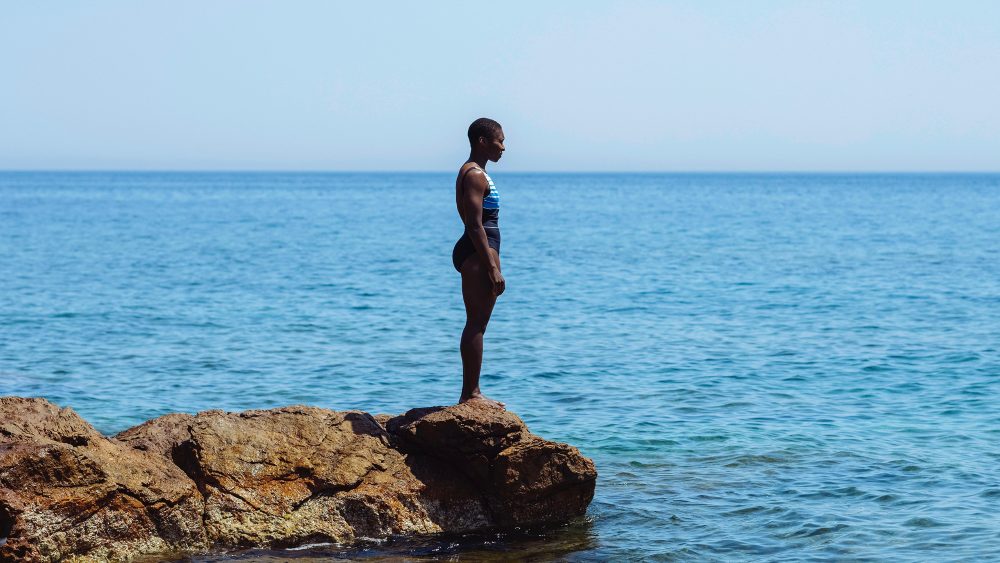This sensitive, tender drama from Anthony Chen feel like a more narratively direct cousin to Adura Onashile‘s astonishing Girl that opened Glasgow Film Festival in 2023. Both grapple with the possibility of beginning to heal after a trauma that would be unthinkable to most, and both have female protagonists who’ve walled themselves off in an impregnable silence. But although Drift‘s narrative is more direct, that doesn’t mean it’s simple. There’s a nuance of character that goes far deeper beyond that of a broken survivor, and a story that depicts appalling atrocity but dares to accommodate hope.
Jacqueline (Cynthia Erivo) is a young Liberian woman who’s barely existing since arriving on a Greek island. She lives in a cave, gives the odd foot massage to heedless tourists for a few Euros, and manages to avoid arrest by the local police by passing as a tourist thanks to a cut-glass English accent. This suggests that she’s from a more affluent background than first appearances suggest. One day she meets friendly American tour guide Callie (Alia Shawkat), who senses another lonely soul. Jacqueline claims she’s here with her husband, suspicious of any open displays of friendliness. Callie clearly senses she’s not telling the truth, but is happy to strike up another conversation when Jacqueline appears on her tour route again. The pair begin a tentative friendship, and the truth about Jacqueline’s past slowly emerges.
Drift could have been a blunt weepie, but Erivo is an intuitive performer with immaculate control, and Chen’s direction – from a script by Susanne Farrell and Alexander Maksik, adapting his own novel A Marker to Measure Drift – is delicate and tasteful, favouring slow revelation through character, at least in the present-days scenes. It’s a tricky balance, as Jacqueline as a character is initially frustrating to watch, as she actively avoids people who are clearly friendly. It isn’t until the dots of her past begin to be joined that a real sense of empathy for her is established. For what isn’t stated is as important as what’s shown. We’re not sure of the time period, how Jacqueline escaped to Greece. We do learn that she’s English-educated and had a white girlfriend (The Souvenir‘s Honor Swinton-Byrne) whose family were very welcoming. We also find out that she is the daughter of a Liberian minister, and the family found themselves on the wrong end of a violent political coup.
Callie acts almost like an audience surrogate, as Jacqueline’s past begins to emerge as Callie begins to take an interest. It’s necessary that Callie is more broadly drawn as a character – beyond her own heartbreak we don’t get to know much her – but Shawkat’s keen, compassionate turn makes the most of it. It makes sense that Callie wouldn’t reveal too much of her own when patiently giving her new friend the space and time to unburden herself of something awful and enormous. Any potential attraction between the pair is also kept so firmly in subtext that it ultimately comes down to the viewer’s own hopes for Jacqueline and the possibility of a happy future for her.
There are no great moments of healing – as in Girl, the establishment of a solid base from which to begin that process is a triumph – but eventually more more explicit scenes fill in Jacqueline’s ordeal. Chen avoids anything exploitative by keeping violence offscreen. Haunting aftermath, Jacqueline’s outpouring of grief as she tells the tale, and Callie’s glistening eyes, are more than enough. It’s a complicated moment of horror and catharsis. Some will find the lack of clear resolution for the character as vexatious, particularly when Erivo and Chen have done so much to make Jacqueline such a sympathetic protagonist with such deft characterisation, but too neat an ending would feel cheap given the relative subtelty of the story-telling. Drift is a deeply human, moving, and sensitively-told drama.
Drift receives its UK Premiere Thu 7 Mar and screens Fri 8 Mar 2024


Comments